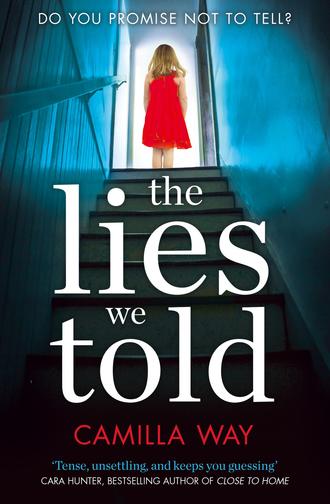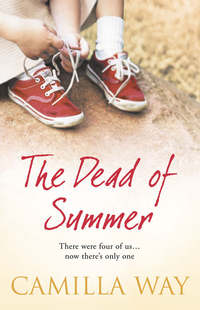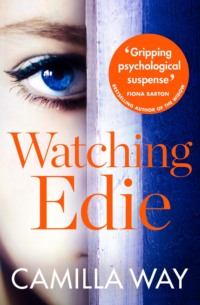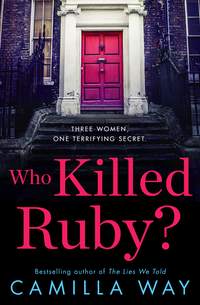
Полная версия
The Lies We Told: The exciting new psychological thriller from the bestselling author of Watching Edie
Clara swallowed hard, her mouth dry with nerves as she went over again what she’d told the officer on the front desk, DC Mansfield’s calm, almond-shaped eyes flicking up to meet hers at various points in her story.
‘And there’d been no arguments between you recently,’ she asked, ‘no indication that Luke might want out of the relationship?’
‘No! And as I said, he’s left his mobile and credit card, and he had an important interview at work he’d prepared hard for. We were … happy!’ she heard her voice rising and felt Mac’s hand on her arm.
Mansfield nodded, then opened the laptop and read through the emails. ‘I see.’ When she looked up again, she cleared her throat decisively. ‘OK, Clara, I’m going to hang on to this for now, and talk it over with my sergeant in CID. What I suggest you do now is go home and wait for us to get in touch, and in the meantime, if you hear from Luke, or if anything else suspicious happens, please call us straight away.’ She got up and with another brief smile and a nod of her head, indicated for Clara and Mac to follow her.
But Clara remained seated, staring up at her in alarm. ‘CID? So you agree those emails could be linked to his disappearance?’ She had half hoped to be fobbed off, to be told she was overreacting, that there was clearly an innocent explanation for it all. The seriousness with which Mansfield was taking her concerns caused darts of panic to shoot through her.
‘It’s possible,’ the DC said. ‘There could be any number of reasons why he’s taken off for a bit. He might have gone out and had a few drinks and not made his way home yet – that happens. Hopefully there’s nothing to worry about. But as I said, go home, and someone will be round to see you as soon as possible. We have your address.’ She went to the door and held it open, and reluctantly Clara got to her feet.
‘Are you all right?’ Mac asked as they trudged back down Kingsland Road towards home.
‘I don’t know. It all feels so strange. You see on the news and stuff about people disappearing, you see those Facebook appeals, and I can’t believe he’s one of them, it’s too surreal. Half the time I’m telling myself there’s some rational explanation and I should just chill out, the other half I feel guilty because I’m not tearing through the streets searching for him. I don’t know what to do.’
He nodded gloomily. ‘He’ll turn up. It’s going to be OK. They’ll find him,’ but she could hear the worry in his voice. As they walked she thought about Mac and Luke, and the friendship they’d had for so many years. Of the two of them, Luke had always had the loudest personality, Mac with his quiet dry wit the straight man to Luke’s clown. And if Luke’s love of the limelight meant he sometimes didn’t know when to quit, ensuring he was always one of the last to leave any party, Mac was invariably there to keep his friend out of trouble, bundling him into a cab when he’d had too much to drink, ensuring that he eventually made it home in one piece. Instinctively now she reached out and linked her arm through his, more grateful than she could say for his calm, steady presence. He glanced down at her and smiled, and together they walked on in silence.
She felt desolate when they returned to the empty flat. There was Luke’s leather jacket hanging on its peg; on the table by the window was a half-completed Scrabble game they’d abandoned two nights before. The last record they’d been listening to sat silent and still on the turntable. It was as though he’d stepped out only moments before, as though he might reappear at any second with a bottle of wine tucked under his arm, smiling his smile and calling her name. He hadn’t taken anything with him – not one single thing a person who was intending to leave home might take.
Mac came and stood beside her. ‘Would you like me to stay over?’ he asked. ‘I could sleep on the sofa.’
She smiled gratefully, suddenly realizing how much she’d been dreading another night alone. ‘Thanks, Mac,’ she said.
She was awoken by the sound of her intercom buzzing. Groggily she sat up, looking about her in confusion, surprised to see that she was still wearing her clothes. The fact of Luke’s disappearance hit her like a train and she gasped in distress. She remembered she’d gone to lie down while waiting for the police to come, had put her head on Luke’s pillow, breathing in the scent of his hair and skin, a feeling of utter hopelessness filling her; nervous exhaustion rolling over her in heavy waves. She must have fallen asleep.
Dazedly she stumbled to her feet and going into the living room saw Mac blinking awake on the sofa. She glanced at the clock: eight a.m. Again the intercom buzzed loudly and she hurried over to answer it. ‘Hello?’
‘Miss Haynes? DS Anderson from CID. Can I come up?’
He was a large man, Detective Sergeant Martin Anderson. Mid-thirties, a slight paunch, small blue-grey eyes that regarded her from the depths of a ruddy face. A proper grown-up, with a proper grown-up job: even though he was less than a decade older than Clara and Mac, he might as well have belonged to an entirely different generation. She clocked his wedding ring and pictured a couple of kids at home who idolized him. A very different sort of life to the ones led by her and Mac and their friends, with their media jobs, their parties and endless hangovers. He was accompanied by DC Mansfield, who nodded at her and flashed her brief, impassive smile.
‘This is Mac, Luke’s best friend,’ Clara explained nervously as the four of them sat down in the living room. The flat felt very crowded suddenly; a dark cloak of authority and gravity descending upon her home that gave her worst fears credence and made fresh anxiety twist in her belly. Outside on the street someone gave a long, low whistle, a car engine stuttered into life; the world continued as usual, oblivious to the tense, waiting silence of this room.
‘I’ve been passed on the information you gave DC Mansfield yesterday,’ Anderson began in a voice that was deep and measured, a faint accent curling around its vowels that Clara’s London ears identified vaguely as Midlands.
‘I take it you’ve had no contact from Luke since then?’
Clara shook her head. ‘No.’
He nodded. ‘In most cases the missing person turns up within forty-eight hours. But due to the harassment Luke’s been receiving, we need to make sure there’s nothing more to this. I understand there’d been a letter … some photographs as well as the break-in a few months ago? Do you have them here with you?’
For the next ten minutes Clara went about the flat, gathering the various items that DS Anderson requested – Luke’s bank details, the names and numbers of his friends and family and place of work, a recent photograph, his passport and so on. She moved as if in a dream, stepping around DC Mansfield, who glanced at her apologetically as she conducted her own search, opening various cupboards and drawers. ‘What are you looking for?’ Clara asked when she found her scrutinizing the bathroom cabinet.
‘It’s standard procedure,’ she said, not answering her question. ‘I’m going to need something with Luke’s DNA, by the way. Did he take his toothbrush with him?’
Clara shook her head. ‘He didn’t take anything with him.’ She handed over Luke’s green toothbrush, leaving her own red one alone in its cup, and tried to fight the tears that sprung to her eyes.
When she returned to the living room she gave DS Anderson everything she’d collected and he nodded his thanks. ‘Luke left his mobile behind too,’ she said, handing it to him. ‘The code’s 1609.’ The sixteenth of September. Her birthday. She remembered how he’d smiled and said, ‘That way I’ll never forget.’ She watched as that, too, was efficiently deposited into a clear plastic evidence bag.
Anderson turned his attention to Mac. ‘And how about you, Mac? How long have you and Luke been friends?’
‘Eighteen years. Since we were eleven.’ Clara almost smiled at the way this giant Glaswegian was suddenly sitting up straighter, his knees pressed neatly together, meek as a kid in front of his headmaster.
‘And there was nothing about his behaviour recently that struck you as unusual?’
‘No … I don’t think so, no.’
Clara glanced at him. Was there something a little strange about the way Mac said that? The brief hesitation before he spoke, something slightly off about his tone? She couldn’t quite put her finger on it.
Twenty-five minutes after they arrived, the two officers got up to leave. ‘I think I have all I need for now,’ Anderson told them. ‘I’m going to talk to Luke’s parents and his employers next.’ He paused, consulting his notes. ‘Brindle Press? W1. Is that right?’ When Clara nodded he went on, ‘We’ll also look at any relevant CCTV footage, to see if we can trace his movements after he left work yesterday.’ He glanced at Mac. ‘And if you could both think about anything that might have happened in the last few weeks that could be relevant – any unusual phone calls, anything out of character he might have said to either of you, or any change in his usual behaviour …’
‘Yes, yes of course,’ Mac and Clara said together.
He nodded. ‘We’ll be in touch.’
After they left, Clara sank on to the sofa. ‘Jesus,’ she murmured. She put her head in her hands. ‘At least they’re taking it seriously, I suppose.’ When Mac didn’t reply she turned to find him standing with his back to her, gazing out of the window. ‘Are you OK?’ she asked.
He was silent for a while, and then she heard him mutter something to himself. She stared at him in bewilderment. ‘Mac? What’s the matter? What is it?’
He turned to face her. ‘Jesus, Clara, I’m so sorry.’
‘Sorry? What on earth for?’
He raked his fingers through his hair in agitation. ‘I really didn’t want you to find out like this. But it’s all going to come out now – the police are going to talk to everyone – his work, his friends; everyone, and I don’t want you to hear about it that way.’
‘For God’s sake, Mac! Hear about what?’
Mac closed his eyes for a moment. ‘Luke’s affair.’
The shock was like a body blow, knocking the air from her lungs and leaving her reeling. And when she was finally able to speak her voice was barely more than a whisper. ‘Affair? Who with?’
‘A girl from work. Her name’s Sadie. I think she’s …’
On the ads team. Blond hair, legs to her armpits. Barely twenty. ‘Yeah, I know who she is.’ She felt strangely incapable of reaction, as if the information wouldn’t quite penetrate her brain. ‘How long?’
‘A few weeks, maybe a couple of months. But it finished ages ago. Listen, Clara—’
She cut across him, ‘A couple of months? And is he … does he love her?’
His reply was emphatic. ‘God, no! No, of course not. He loves you, Clara, I know he does.’
She gave a weak laugh. ‘Clearly.’
‘It was just … oh God, Clara, I’m so sorry.’
She stared at him. ‘But he asked me to move in with him! Why? Why do that if you’re shagging someone else?’
‘He knew Sadie was a huge mistake. He realized it was you he wanted.’
She nodded. ‘Great. Lucky me.’
A silence. ‘Why the fuck didn’t you tell me, Mac?’ she asked him quietly. She realized she felt almost as betrayed by him as she did by Luke, almost as hurt by her friend’s deceit as by the man who was supposed to be in love with her. She thought of all the times she, Luke and Mac had spent together, when she’d been oblivious to the secret they shared, and her cheeks burned with anger and embarrassment.
‘I—’
She glanced at him, her voice suddenly hard. ‘Don’t tell me. Because you’re his best friend. Lads sticking together, right? Some stupid fucking boy code?’
His face was a picture of misery. ‘Clara, listen to me …’
She waved his words away. ‘Does everyone know?’ She thought of Luke’s large circle of friends – people they socialized with together, met up with at the pub, invited round for dinner, and her humiliation deepened. ‘All of you, all his mates?’
‘No! God, I don’t know. He felt awful about it. He didn’t know what to do, he was in absolute bits …’
It was then she remembered something. ‘That’s what you meant about him going away to clear his head,’ she said, and the flicker in Mac’s eyes confirmed it.
‘At first I thought maybe he was with her. But I called her and he wasn’t. Then I thought maybe he did go away somewhere to try and sort himself out, get his head straight, but … I don’t think so. It doesn’t add up – not telling work, his parents, me, not taking any of his stuff … and the thing with Sadie ended ages ago.’
From outside on the street Clara heard the jingling crash of crates of beers being delivered to the bar on the corner. They sat and listened to it, a sound she associated with summer, with sitting outside pubs on sunlit pavements with Luke, with being happy.
‘Clara? Are you OK? I’m sorry. I’m so fucking sorry.’
She looked at his anxious face and suddenly felt so tired she could barely stand. She sank back on to the sofa. ‘Just go, Mac,’ she said quietly. ‘Just go the fuck home now, will you?’
7
Cambridgeshire, 1988
There was a local woman, a childminder named Kathy Philips, who occasionally took care of Hannah for me when I needed a break. She was, in hindsight, a bit slack; her home was haphazard, she had four children of her own, plus at least one other mindee whenever I dropped Hannah off. But she was a kind, no-nonsense sort, and, most importantly, she was willing – by then Hannah’s reputation had spread throughout our village; there weren’t a lot of people willing to look after her. I was desperate, I’ll admit.
I suppose I shouldn’t have been surprised that Hannah did what she did. She had told me that morning she didn’t want to go: ‘They’re stupid and boring and their house smells of wee,’ was I think how she put it. So this, I expect, was her way of punishing me.
I’ll never forget the fury in Kathy’s voice when she called. ‘Come and pick your daughter up right now,’ she spat, before slamming the phone back down. As I drove over there I mentally ran through the possibilities. Attacked one of the other kids? Stolen something? But no, it was far worse than either of those things. Kathy was waiting for me at her door when I pulled up and the expression on her face made my blood run cold. ‘She set fire to my son’s bedroom,’ she told me through gritted teeth.
There was no coming back from that. There was no sweeping that under the carpet – no pretending she’d grow out of it, that it was merely some dreadful phase. Hannah had taken some matches from Kathy’s handbag, sneaked upstairs and made a pile of Callum’s books, then set fire to them. Kathy, luckily, had smelt the smoke before it had spread too far – but not before she’d burned a large brown hole in the carpet. I hate to think what would have happened if it had been allowed to take hold.
‘Callum was being annoying,’ Hannah shrugged, when I asked her why she’d done it. By this time she was seven years old.
It was a small village. She had already bullied half the school by then and Kathy wasn’t the type to keep anything to herself. Soon everyone would know. Long ago, in my naïve, pre-children days when I used to dream about my future family, I believed I would make friends with all the other local mothers. Our kids would play happily together in each other’s gardens; lasting friendships would be formed. Of course back then I believed we’d still be living in our old village, the one I myself had grown up in. But it wasn’t to be. Still, I’d hoped very much to be a part of this new community. It was to be a fresh start for us all. Yet here we were: my child was a pariah. She had no friends, was never invited anywhere to play. The other school mums would meet up regularly but never include me. And now this. I didn’t know how I’d be able to face going out in public again.
The next day, after dropping Hannah off at school, I drove to Peterborough library. I headed to the Psychology section and began to search. I scarcely knew what I was looking for until I found it, and when I did, I barely noticed my tears as they fell.
When Doug got home from work that night I was sitting on the sofa waiting for him. He’d got back late the night before so we hadn’t had a chance to talk properly about what Hannah had done and he looked at me warily as he came in.
‘I just want you to listen to me, OK?’ I said.
When he nodded and sat down next to me I handed him the wedge of photocopies I’d made that afternoon. He glanced at me, brow furrowed, before flicking through them. I held my breath.
Finally he looked up, his eyes wide. ‘Personality Disorders in Childhood?’ he said. ‘Early Warning Signs of Sociopathy? Are you serious?’
I leant towards him. ‘Doug, it’s time we faced facts. We can’t continue like this, Hannah set fire to Callum’s room, she hurt my eye so badly I had to go to A&E. She killed Lucy … then there’s the lying, the stealing, the bullying …’ I could hear my voice rising and I made myself stop and take a breath. ‘There’s something called Antisocial Personality Disorder and the books say there are certain red flags to look out for.’ Eagerly I took the printouts from him and flicked through until I found the one I wanted, reading aloud, ‘“Antisocial Personality Disorder and sociopathy can be traced back to childhood: desire to torture or kill animals; predilection for arson, manipulation of others. Lack of remorse, apparent absence of emotion …”’ I looked up at him. ‘Doug, there might as well be a picture of Hannah right next to this!’
‘Beth,’ he said, shaking his head, ‘Come on now …’
‘Why are you denying it?’ I asked. ‘We could get her help. We could get us help.’
‘So, what – you want her committed?’ he replied, his distress adding a harsh angry edge to his voice. ‘Locked up? Are you saying she’s – what? – some sort of future serial killer? Is that it?’
‘No! No of course I’m not saying that. I’m as scared as you are. I love Hannah! But I know there’s something badly wrong with our little girl, and we need to get her help as soon as possible. I know you’re frightened, but it doesn’t mean that we don’t love her. And what – what if she hurts Toby?’
He looked away. ‘That shrink we took her to before, he said there was nothing wrong with her.’
‘He said she was too young to make a diagnosis.’
‘Christ.’ He got up and paced around the room, coming to a stop by the window, where he stood looking out in silence. When he finally spoke his voice was tight and strange. ‘If this is true, if you’re right … what if they take her away from us, Beth? What if they say we can’t look after her properly, that it’s our fault she’s the way she is?’
‘She’s getting worse, Doug,’ I said gently. ‘She needs help. We all do.’
He nodded, and I held my breath while he continued to stare out of the window. ‘OK,’ he said at last. ‘OK. Let’s try to get her another referral.’ He glanced at me. ‘As long as it’s not with that berk in Peterborough.’
He smiled sadly at me then, something he hadn’t done, it seemed to me, for a long time, and I could have cried with relief. And I think it was that rare moment of closeness that moved me to say what I said next, to bring up something from years before, that we’d both promised never to mention again. ‘I want to talk about what happened, Doug,’ I blurted. ‘About what we did.’
He knew instantly what I meant, and he became very still. My words hung in the air between us. ‘Look, Beth,’ he said at last, ‘I can’t deal with this now …’
‘Please, Doug,’ I begged. ‘Just let me talk about it. I need to. I think about it all the time, don’t you? I wake up with it on my mind, the lies we told, that girl’s poor family …’
His voice was sharp. ‘Beth, that’s all in the past. We agreed—’
‘But, what we did was wrong. It was so wrong, we should never have—’
He glanced at me and the sudden coldness in his eyes stopped me in my tracks. ‘You wanted to do it. And we have to live with that now.’
I gaped at him. ‘Me? I wanted? Doug, we both did.’ He shook his head and got to his feet. ‘Please, Doug, please don’t go.’ I started to cry.
He stopped, his back to me, he was very still and quiet, and then with a sudden movement, he went quickly from the room. I heard the front door slam shut. He didn’t come back until many hours later, drunk and silent and still too furious even to look at me.
We barely spoke in the following days. I made the appointment with the GP, who referred me to a child psychologist in Cambridge who had a waiting list of several weeks. The loneliness in the days after my talk with Doug was unbearable. I sank deeper and deeper inside myself, brooding over things that should have been left firmly in the past. I knew there was only one person who could help me – the same person who’d provided all the answers once before; who knew our secret, as we knew theirs. It would be such a relief to talk about it, like lancing a wound that had been allowed to fester too long. Of course, I knew Doug would never agree, would be horrified at the very idea of us being in contact again – yet the more I fantasized about making the phone call, the more desperate I became to do it.
8
London, 2017
After Mac had left, his revelation ringing in her ears, Clara sat motionless on the sofa, her shock so absolute that, for now at least, she felt nothing, the world stripped of sound and sensation, like the aftermath of an explosion. But she knew the pain was coming; could sense the tsunami swelling on the horizon, gathering strength, waiting to break.
Her gaze fell to the photograph of her and Luke on Hampstead Heath, her face turned so lovingly towards his, her eyes shining with happiness. Idiot. She thought now of all the hundreds of times when he’d appeared to love her. Which of those had been a lie? When had he started to be dissatisfied with her, to begin to draw away, look elsewhere?
She remembered their first date. A hazy summer’s evening on the South Bank when suddenly he’d taken her hand and led her away from the crowds, the street performers, the bookstalls, the bars and restaurants, down mossy stone steps to the river’s bank, where small groups huddled on the silty sand, smoke rising from a campfire, music from a busker’s guitar, the lights of the embankment trailing across the river’s surface, the last of the sun falling behind the city’s skyline. And when he’d kissed her she’d never felt so deliriously, stupidly happy. Not an expert in these things, she had fallen too deeply, too quickly, entirely forgetting to keep a part of herself back, to put a lifejacket on in case of emergency.
Sadie. Sadie fucking Banks. Did everyone know? Their colleagues, their friends? At that moment she remembered the card DS Anderson had left for her and she pulled it out now, staring down at it until with sudden decisiveness she picked up her phone and dialled the number before she could change her mind, before the tsunami broke and dragged her under.
‘DS Anderson.’
She swallowed. ‘It’s Clara Haynes. I— you—’
‘Yes. Hello, Clara, how can I help?’
She forced herself to speak. ‘Luke was having an affair,’ she said, in the unrecognizable, matter-of-fact voice of a stranger. ‘Her name’s Sadie Banks, she works at Brindle too. Maybe you should speak to her. She might have a better idea of where he is.’ Her voice cracked on the last word and when she hung up the pain crashed over her, dragging her down in its vicious undertow, filling her lungs with grief.
A long time later she sat, head in hands, her face raw from crying. What should she do now? Pack her bags and move out? Had Luke simply left her for someone else? Was that all this was: merely a gutless way of telling her she was dumped, that he hadn’t loved her after all?
When she arrived at work the next morning – the thought of staying at home alone in their silent, waiting flat had been unbearable – she hurried towards her magazine’s office, keeping her head down, unable to contemplate how she could begin to answer even the most innocent question about where she’d been. Perhaps the police hadn’t called there yet, she thought hopefully; perhaps no one had an inkling of the bomb that had detonated in the middle of her life. Making eye contact with no one, she made her way quickly to her desk.






